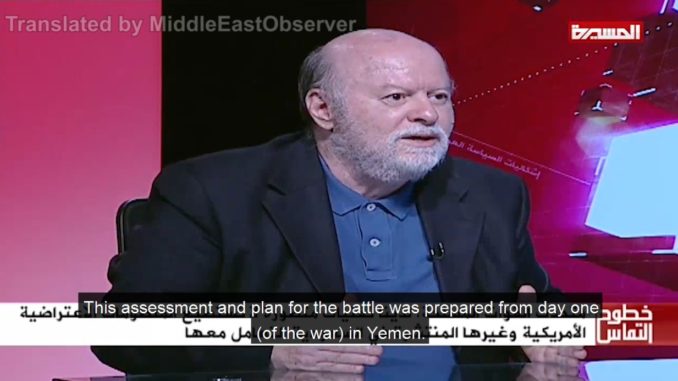
Description:
Senior Lebanese political analyst Anees Naqqash implied in a recent interview that the Iran-led ‘Resistance Axis’ was the one that helped the Houthi Ansarullah-led Yemeni government obtain the long-range UAVs and missiles that have tipped the balance of the war and surprised the Saudi-led coalition in recent months.
Naqqash, who is closely-linked to Lebanon’s Hezbollah movement, is a prominent fixture on Lebanese and Arab television, especially on channels affiliated with the so-called ‘Resistance Axis’.
The ‘Resistance Axis’ broadly refers to a strategic anti-Israel/anti-US imperialist alliance composed of, but not limited to, Iran, Syria, Hezbollah, Iraq’s Hashed al-Shaabi, Yemen’s Ansarullah, and various Palestinian armed factions.
Source: Al-Maseerah Tv
Date: 21 June, 2019
Transcript:
Naqqash:
The Yemeni issue is an independent issue and moves based on its own strategy.
Meaning that even if there were no sanctions on Iran, and no conflict with the US, or anything else, the Yemeni issue (would have moved) based on the four phases that I already touched upon: ‘Absorbing the shock’, ‘Strategic steadfastness’, then ‘Beginning tactical assaults’, then the next phase which we have not yet witnessed, and that is the ‘Strategic attack’ (phase). This assessment and plan for the battle was prepared from day one (of the war) in Yemen.
I’m providing you with (insider) information. The question was: how do we approach this battle?
Host:
So what happened today (Yemeni attacks on Saudi Arabia) is not a coincidence?
Naqqash:
Not at all. It was all planned. The coincidence is that the Americans opened up the Iranian file, and people started linking these two issues together. The Yemeni issue is moving based on a strategy that was decided from the beginning of this battle. In other words, when the Saudis (launched) the war in Yemen, they fell into a trap. There were (high) hopes placed upon the steadfastness of Yemenis and their ability to engage in fierce warfare. It was first required that (the Yemeni people’s) ability to remain steadfast be enhanced, then their military capabilities be developed, in order to tip the (strategic) balance (of the war), and this is what happened.
You (Yemenis) did not have cruise (missiles), nor UAVs, nor (weapons) with a range of 2,700 km, nor anything of the sort. The (Yemeni army) had some missiles which it had bought from North Korea or China. The number (of these missiles) was known. It also had a few Scud missiles. Ali Abdullah Saleh himself, any minister or any deserter from the Yemeni army could have informed Saudi Arabia what the Yemeni army had. However, (the Saudis did not anticipate) such advancements (in military capabilities) during the war. Yet this occurred even while (Yemen) was being bombarded.
Therefore, today (the Saudis) are in a state of fear because this advancement has been proven. In other words, you did not launch dozens of attacks in one day, yes, but you proved to them that your missiles can reach thousands of kilometers, and that you could send not just one, but (even) seven UAVs at once. It has been proven also that you are producing dozens and even hundreds of (such UAVs).
And so all this talk about such production capabilities and the ability to keep fighting, reveals that all of the Saudi geography, including its strategic and sensitive sites, and infrastructure, are in practice – not just theoretically – potential targets of Yemeni firepower.
Host:
You’re saying all of Saudi territory is now within the range of Yemeni firepower?
Naqqash:
Yes. This has been proven with evidence. When (Yemenis) launch a missile with a 1,700 or 2,000 km range – what is the size of Saudi territory? When Yemenis send drones with such quantities travelling hundreds of kilometers, what is left of the Saudi interior? Therefore, all of this has been proven via tactical operations. But what if the assault was a ground, aerial, missile and coordinated attack, in addition to the collapse in morale of (Saudi coalition) forces, and this will definitely occur, when such (forces) lose all their trust in their military command and realise that their leadership was stupid for getting them into this mess, and all the contradictions begin to unravel…

Leave a Reply